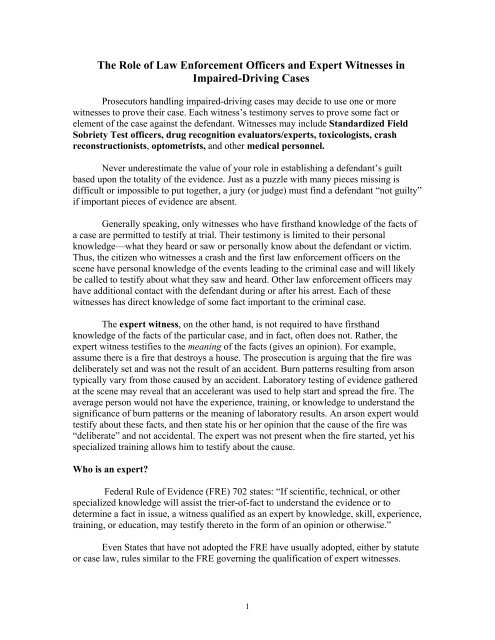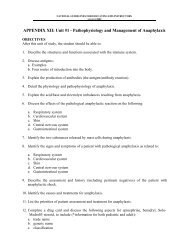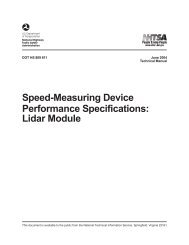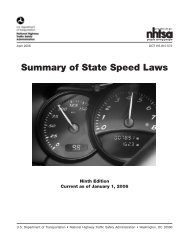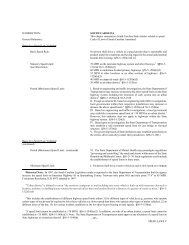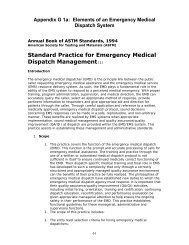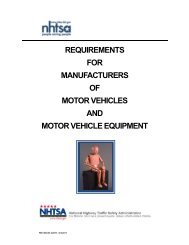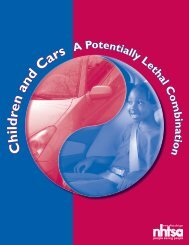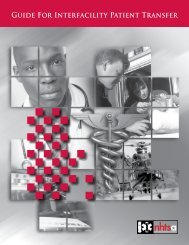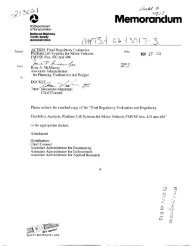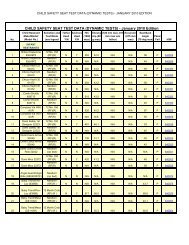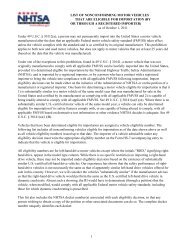The Criminal Justice System: A Guide for Law Enforcement ... - NHTSA
The Criminal Justice System: A Guide for Law Enforcement ... - NHTSA
The Criminal Justice System: A Guide for Law Enforcement ... - NHTSA
You also want an ePaper? Increase the reach of your titles
YUMPU automatically turns print PDFs into web optimized ePapers that Google loves.
<strong>The</strong> Role of <strong>Law</strong> En<strong>for</strong>cement Officers and Expert Witnesses in<br />
Impaired-Driving Cases<br />
Prosecutors handling impaired-driving cases may decide to use one or more<br />
witnesses to prove their case. Each witness’s testimony serves to prove some fact or<br />
element of the case against the defendant. Witnesses may include Standardized Field<br />
Sobriety Test officers, drug recognition evaluators/experts, toxicologists, crash<br />
reconstructionists, optometrists, and other medical personnel.<br />
Never underestimate the value of your role in establishing a defendant’s guilt<br />
based upon the totality of the evidence. Just as a puzzle with many pieces missing is<br />
difficult or impossible to put together, a jury (or judge) must find a defendant “not guilty”<br />
if important pieces of evidence are absent.<br />
Generally speaking, only witnesses who have firsthand knowledge of the facts of<br />
a case are permitted to testify at trial. <strong>The</strong>ir testimony is limited to their personal<br />
knowledge—what they heard or saw or personally know about the defendant or victim.<br />
Thus, the citizen who witnesses a crash and the first law en<strong>for</strong>cement officers on the<br />
scene have personal knowledge of the events leading to the criminal case and will likely<br />
be called to testify about what they saw and heard. Other law en<strong>for</strong>cement officers may<br />
have additional contact with the defendant during or after his arrest. Each of these<br />
witnesses has direct knowledge of some fact important to the criminal case.<br />
<strong>The</strong> expert witness, on the other hand, is not required to have firsthand<br />
knowledge of the facts of the particular case, and in fact, often does not. Rather, the<br />
expert witness testifies to the meaning of the facts (gives an opinion). For example,<br />
assume there is a fire that destroys a house. <strong>The</strong> prosecution is arguing that the fire was<br />
deliberately set and was not the result of an accident. Burn patterns resulting from arson<br />
typically vary from those caused by an accident. Laboratory testing of evidence gathered<br />
at the scene may reveal that an accelerant was used to help start and spread the fire. <strong>The</strong><br />
average person would not have the experience, training, or knowledge to understand the<br />
significance of burn patterns or the meaning of laboratory results. An arson expert would<br />
testify about these facts, and then state his or her opinion that the cause of the fire was<br />
“deliberate” and not accidental. <strong>The</strong> expert was not present when the fire started, yet his<br />
specialized training allows him to testify about the cause.<br />
Who is an expert?<br />
Federal Rule of Evidence (FRE) 702 states: “If scientific, technical, or other<br />
specialized knowledge will assist the trier-of-fact to understand the evidence or to<br />
determine a fact in issue, a witness qualified as an expert by knowledge, skill, experience,<br />
training, or education, may testify thereto in the <strong>for</strong>m of an opinion or otherwise.”<br />
Even States that have not adopted the FRE have usually adopted, either by statute<br />
or case law, rules similar to the FRE governing the qualification of expert witnesses.<br />
1


